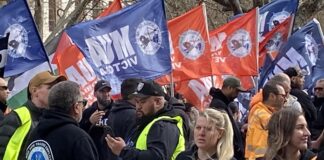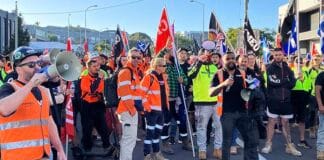Noel Washington, an official with Construction Division of the Victorian CFMEU, will be called before a court after refusing to be interrogated by the Australian Building and Construction Commission (ABCC), a Howard-era anti union body, funded by taxpayers.
Ironically, he could the first person jailed under the former Howard government’s industrial laws because Labor pathetically chose to retain the ABCC until 2010.
If a building worker or official is called before the ABCC, they have less rights than someone accused of murder or other serious crimes. You cannot choose your own lawyer, have no right to silence, you cannot talk to anyone about the interrogation when it is over and if you refuse to attend an interrogation, there is the threat of a six month jail sentence.
Washington was not charged with or accused of anything by the ABCC, but had to “give evidence” on what was said at a union meeting in 2007.
The ABBC threatens building workers with individual $22,000 fines and loss of pay if we stop work for any reason, even over safety, in the most dangerous of industries.
In March, 100 building workers rallied outside the ABCC in Melbourne, protesting the secret interrogation of building worker Joe Mannucci. Joe was being questioned because he called a WorkSafe Victoria inspector to his inner Melbourne suburb building site. Workers who were renovating the St Kilda Town Hall decided to call in WorkSafe after an electrical switchboard was moved and left hanging by steel tie wires at the site.
The CFMEU has called on the Rudd government to dismantle the ABCC and end its secret interrogation powers, set up by the Howard government. The national conference of the CFMEU in February voted to develop a campaign to this end.
The union looks set to call a protest oustide the hearing when Noel Washington faces court. But to put real pressure on the ABCC to back down, this needs to have thousands of building workers off sites all over Melbourne. This type of action can make the Commission inoperable and win back some of our unions’ basic rights to organise.
By a CFMEU member





